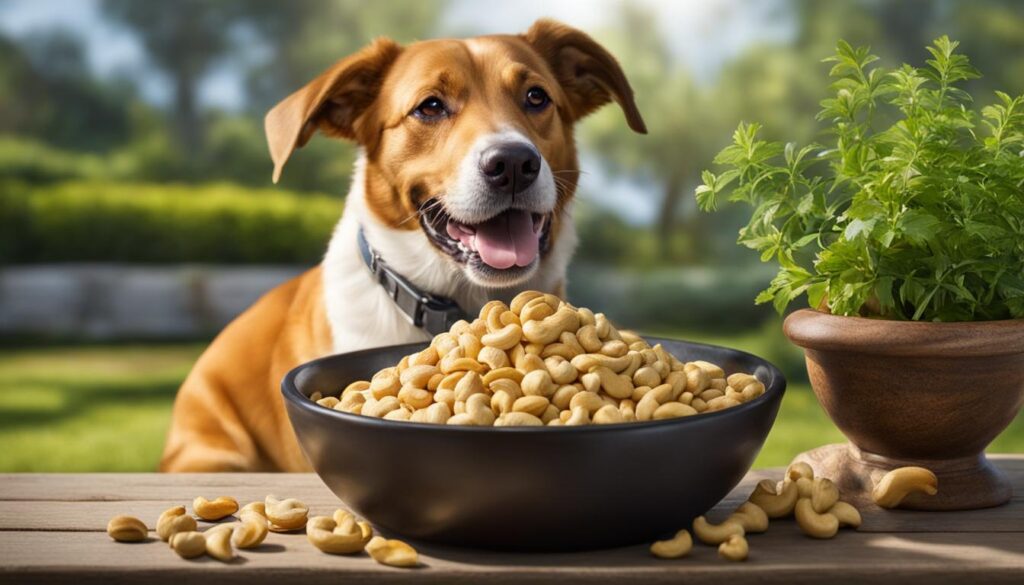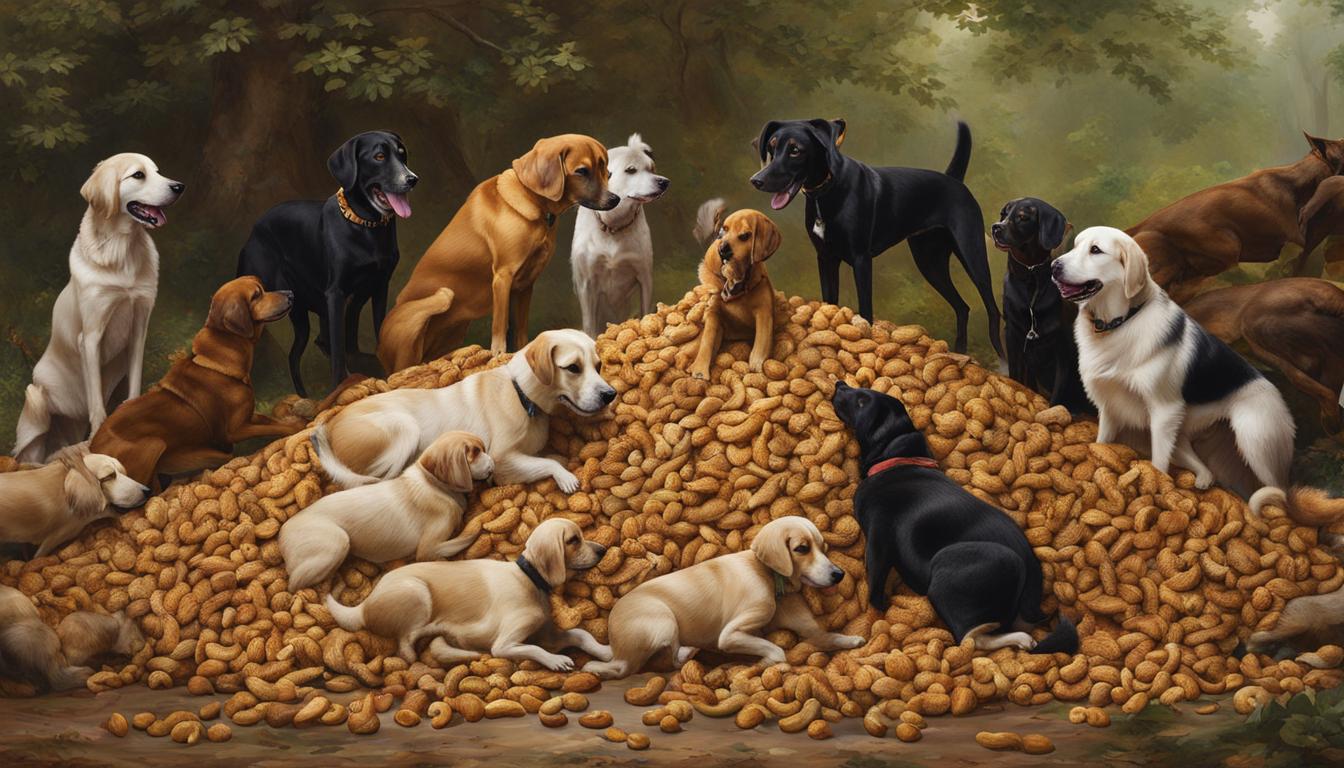Are you a dog owner who loves snacking on cashews? You may be wondering if it’s safe to share this tasty treat with your furry friend. Well, good news! Cashews are generally safe for dogs to eat. Unlike macadamia nuts, cashews are not toxic to dogs. However, there are a few things you need to consider before adding cashews to your pup’s diet.
While cashews can be a yummy and nutritious snack for dogs, it’s important to be aware of the potential risks and benefits associated with feeding them to your canine companion. In this article, we’ll explore the nutritional analysis of cashews for dogs and provide you with all the information you need to make an informed decision.
Key Takeaways:
- Cashews are generally safe for dogs to eat but should be fed in moderation.
- They are high in fat and protein, which can lead to pancreatitis and obesity if consumed in large quantities.
- Watch out for mixed packs of nuts that may contain toxic nuts for dogs.
- Salted cashews can cause salt toxicity in dogs.
- Allergic reactions to cashews in dogs are relatively rare.
The Benefits of Cashews for Dogs
Cashews offer several nutritional benefits for dogs, making them a healthy addition to their diet when given in moderation. These crunchy nuts provide a range of essential nutrients that contribute to your dog’s overall health and well-being.
- Omega-6 Fatty Acids: Cashews contain omega-6 fatty acids, which play a crucial role in controlling inflammation and promoting a healthy coat for your furry friend.
- Antioxidants: These nuts are packed with beneficial antioxidants that help protect your dog’s cells from damage caused by harmful free radicals.
- Fiber: Cashews are a good source of dietary fiber, which aids in digestion and supports a healthy digestive system for your canine companion.
- Protein: Dogs require protein to build and repair tissues, and cashews provide a moderate amount of this essential nutrient.
- Vitamins and Minerals: Cashews contain various vitamins and minerals, such as vitamin K, calcium, copper, and magnesium, which contribute to your dog’s overall health.
It’s important to note that while cashews offer these benefits, they should be given in moderation due to their high fat content. Too many cashews can lead to weight gain and potential health issues, such as pancreatitis. Always consult with your veterinarian to determine the appropriate portion size for your dog based on their size, weight, and overall dietary needs.

The Nutritional Value of Cashews for Dogs
Let’s take a closer look at the nutritional breakdown of cashews for dogs:
| Nutrient | Amount per 100g |
|---|---|
| Calories | 553 |
| Protein | 18.2g |
| Fat | 44.2g |
| Carbohydrates | 30.2g |
| Fiber | 3.3g |
| Calcium | 37mg |
| Potassium | 660mg |
| Phosphorus | 593mg |
| Magnesium | 292mg |
| Vitamin E | 2.2mg |
Remember, these values are per 100 grams of cashews, so be sure to adjust the quantities accordingly based on your dog’s weight and size.
With their nutrient-rich composition, cashews can provide a healthy boost to your dog’s diet when incorporated in moderation. However, always remember to introduce any new food gradually and monitor your dog for any signs of allergies or adverse reactions. Your pet’s health and well-being should always be your top priority.
Potential Risks of Feeding Cashews to Dogs
While cashews are generally safe for dogs, it’s important to be aware of the potential risks associated with feeding them to your canine companion. Understanding these risks will help you make informed decisions about whether or not to include cashews in your dog’s diet.
One of the main concerns with cashews is their high fat content. While healthy fats are an essential part of a dog’s diet, excessive consumption can lead to obesity and pancreatitis. Dogs with pancreatitis may experience symptoms such as vomiting, abdominal pain, and loss of appetite. Therefore, it’s crucial to limit the amount of cashews you give to your dog and opt for moderation.
Another risk to consider is the presence of anacardic acid in cashew shells. This toxin can cause gastrointestinal irritation if consumed by dogs. It’s important to ensure that the cashews you feed your dog are always shelled and free from any traces of the shell, as it can be harmful to their digestive system.
“It’s crucial to limit the amount of cashews you give to your dog and opt for moderation.”
Furthermore, mixed packs of nuts can be dangerous for dogs as they often contain macadamia nuts, which are toxic to dogs. Additionally, salted or seasoned cashews can lead to salt toxicity in dogs if consumed in large quantities. Therefore, it’s best to stick to plain cashews and avoid any added seasonings or salt.
It’s important to note that while cashews are generally safe for dogs, there is always a possibility of allergic reactions. Although the chances of dogs being allergic to cashews are relatively low, it’s still essential to monitor your dog for any signs of allergies, such as itching, redness, or gastrointestinal upset, when introducing cashews into their diet.
Summary:
- Cashews are high in fat and can lead to obesity and pancreatitis if fed in large quantities.
- Anacardic acid in cashew shells can cause gastrointestinal irritation in dogs.
- Mixed packs of nuts can contain toxic macadamia nuts.
- Salted or seasoned cashews can lead to salt toxicity in dogs.
- Monitor your dog for signs of allergies when introducing cashews into their diet.

| Risks | Details |
|---|---|
| High fat content | Can contribute to obesity and pancreatitis |
| Anacardic acid | Toxin found in cashew shells that can irritate the digestive system |
| Mixed packs of nuts | Can contain toxic macadamia nuts |
| Salted or seasoned cashews | Can cause salt toxicity in dogs |
| Allergic reactions | Possible but relatively low chances of dogs being allergic to cashews |
Feeding Cashews to Dogs in Moderation
Cashews can be a tasty and nutritious treat for your canine companion, but it’s important to feed them in moderation. With their high fat content, it’s crucial to understand the appropriate portion sizes for dogs to avoid potential health issues.
The amount of cashews a dog can safely consume depends on their size. Here’s a general guideline:
| Dog Size | Cashews | Cashew Butter |
|---|---|---|
| Extra-Small (2-20 pounds) | 1-2 cashews or 1/4 tablespoon of cashew butter twice a day |
|
| Small (21-50 pounds) | 3-4 cashews or 1/2 tablespoon of cashew butter twice a day |
|
| Medium (51-90 pounds) | 5-6 cashews or 3/4 tablespoon of cashew butter twice a day |
1-2 cashews or 1/4 tablespoon of cashew butter twice a day |
| Large (91+ pounds) | 7-8 cashews or 1 tablespoon of cashew butter twice a day |
3-4 cashews or 1/2 tablespoon of cashew butter twice a day |
It’s important to remember that treats, including cashews, should not make up more than 10% of a dog’s daily caloric intake. Always consult with your veterinarian to determine the appropriate portion sizes for your dog’s specific needs.

Expert Tip:
Remember, cashews are just one type of treat for your dog. It’s always a good idea to offer a variety of healthy snacks, such as carrots, apples, or green beans, to ensure a balanced diet.
Alternatives to Cashews for Dogs
If you’re looking for healthy treats for your furry friend, there are plenty of alternatives to cashews that can provide both nutrition and taste. Here are some safe snacks and tasty options that you can offer to your canine companion:
- Carrots: Crunchy and low in calories, carrots are an excellent choice for dogs. They are rich in vitamins and minerals, including vitamin A, potassium, and fiber.
- Peaches: This juicy fruit can be a refreshing and nutritious treat for dogs. Peaches are a good source of vitamins A and C, as well as fiber.
- Bananas: Dogs often enjoy the natural sweetness of bananas. They are packed with potassium, vitamin C, and vitamin B6. Just remember to remove the peel before giving them to your dog.
- Watermelon: Perfect for hot summer days, watermelon can help keep your dog hydrated. It’s low in calories and high in vitamins A and C.
- Homemade dog biscuits: You can bake your own dog biscuits using ingredients like whole wheat flour, eggs, peanut butter, and canned pumpkin. These biscuits are a healthier alternative to store-bought treats.
Remember to introduce new foods gradually and in moderation to prevent digestive upset. Always consult with your veterinarian before making any changes to your dog’s diet, especially if your furry friend has any specific dietary requirements or health conditions.
By offering a variety of alternative snacks, you can ensure that your dog receives a balanced and nutritious diet while enjoying tasty treats. Remember, healthy treats are just one part of a well-rounded diet that includes a high-quality dog food.
Can Dogs Eat Cashew Butter and Cashew Milk?
While cashews themselves can be safely consumed by dogs in moderation, you may be wondering about other cashew products like cashew butter and cashew milk. The good news is that these can also be given to dogs, but there are a few things to keep in mind.
Cashew butter is a tasty and nutrient-rich option for dogs. It can be used as a spread on treats or given directly to your furry friend. However, it’s essential to choose a plain variety without any added ingredients that could be harmful to dogs. Avoid cashew butters that contain xylitol, macadamia nuts, or nutmeg, as these can be toxic to dogs. Making homemade cashew butter ensures you have full control over the ingredients and can provide a safe and healthy option for your canine companion.
“Cashew butter can be a delicious and nutritious treat for dogs. Just make sure to choose plain varieties without any harmful additives.”
Cashew milk, on the other hand, is safe for dogs to consume, but it should be given in moderation. Like cashew butter, it’s best to choose plain cashew milk without any added ingredients. Store-bought options may contain additives and sweeteners that are not suitable for dogs. If you decide to offer cashew milk to your dog, do so sparingly and as an occasional treat.
Remember, although cashew butter and cashew milk can be included in your dog’s diet, they should not replace their regular meals. These products should be seen as supplementary treats and not as a primary source of nutrition. As always, consult with your veterinarian before introducing any new food or treats to your dog’s diet to ensure it is safe and suitable for their specific needs.
Conclusion
So, can dogs have cashews? The answer is yes, but with caution. Cashews are not toxic to dogs, but they should only be consumed in moderation. While cashews offer some nutritional benefits, such as omega-6 fatty acids and various vitamins and minerals, they also come with potential risks.
Feeding your furry friend too many cashews can lead to obesity and pancreatitis due to their high fat content. It’s essential to watch out for allergic reactions, although the chances of dogs being allergic to cashews are relatively low.
When choosing cashews for your dog, opt for plain varieties and avoid mixed packs or salted options. Additionally, consider exploring alternative treats that are healthier and safer for your furry companion, such as carrots, peaches, or homemade dog biscuits.
As always, it’s crucial to consult with your veterinarian before introducing any new food into your dog’s diet. They can provide personalized recommendations based on your dog’s specific needs and ensure their overall health and well-being.
FAQ
Can dogs eat cashews?
Yes, cashews are generally safe for dogs to eat. However, there are potential risks associated with feeding cashews to dogs, so it’s important to do so in moderation and monitor for any adverse reactions.
Are cashews toxic to dogs?
No, cashews are not toxic to dogs like macadamia nuts. However, other nuts in mixed packs can be toxic to dogs, and salted cashews can cause salt toxicity. It’s important to choose plain cashews and avoid mixed packs or salted varieties.
What are the risks of feeding cashews to dogs?
The high fat content in cashews can contribute to obesity and pancreatitis if fed in large quantities. The shells of cashews contain a toxin called anacardic acid, which can irritate the digestive system. It’s also important to watch out for allergic reactions, although the chances of dogs being allergic to cashews are relatively low.
How much cashews can dogs eat?
The amount of cashews a dog can eat depends on their size. For example, an extra-small dog (2-20 pounds) can have one or two cashews or ¼ tablespoon of cashew butter twice a day. A large dog (51-90 pounds) can have 10-12 cashews or 1 tablespoon of cashew butter twice a day. It’s important to remember that treats should not make up more than 10% of a dog’s daily caloric intake.
What are some alternatives to cashews for dogs?
There are several healthier and safer alternatives to cashews that dogs can enjoy. Carrots, peaches, bananas, and watermelon are nutritious options. Homemade dog biscuits made with whole wheat flour, eggs, peanut butter, and canned pumpkin are another option.
Can dogs eat cashew butter and cashew milk?
Yes, dogs can have small quantities of plain cashew butter and cashew milk. It’s important to avoid added ingredients like xylitol, macadamia nuts, or nutmeg, which can be harmful to dogs. Store-bought options may contain additional ingredients, so it’s best to make homemade versions to ensure the ingredients are safe.
Can dogs have cashews as a regular part of their diet?
Cashews should only be fed to dogs as an occasional treat. While they provide some beneficial nutrients, their high fat content can be problematic if consumed regularly. Always consult with a veterinarian before introducing any new food to a dog’s diet.





